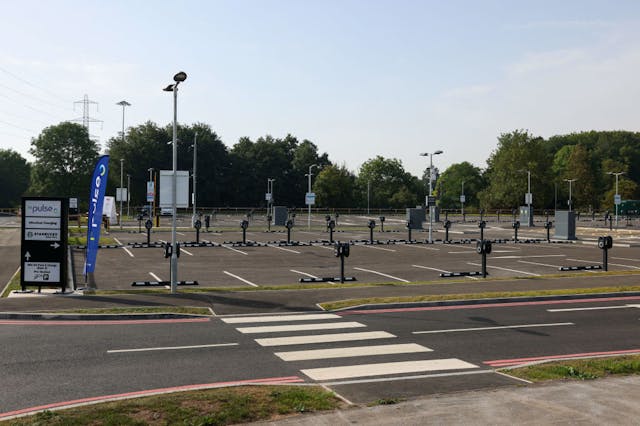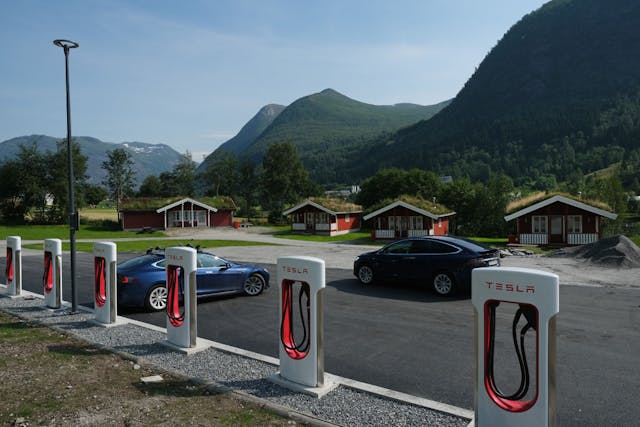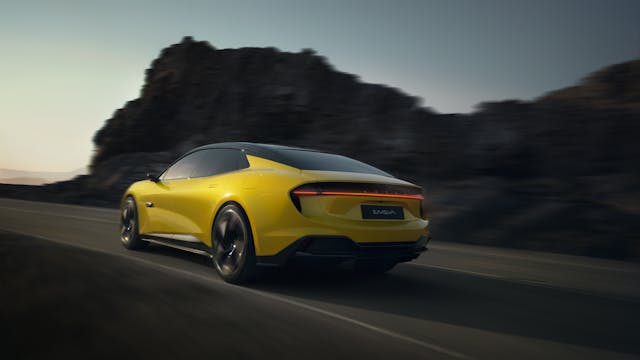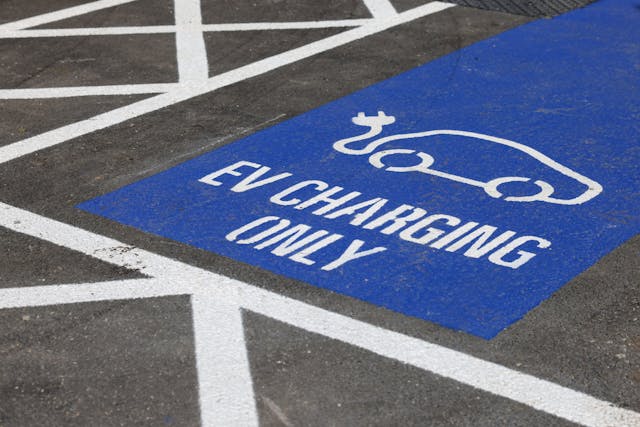Why Are Electric Car Sales Stalling? Ask Norway
As demand for new EVs slows in the U.S., James Mills’ recent screed for Hagerty U.K., concerning the dearth of demand in that market, adds perspective to the phenomenon. Enjoy! -Ed.
What’s this? Shock horror! Those crazy car-driving Brits aren’t exactly flocking to showrooms to buy an electric car.
Goodness. Who’d have thought it? Does the nation need its head testing?
According to the latest figures from the lobbying body known as the Society of Motor Manufacturers and Traders (SMMT), things are not entirely good in the gin-palace showrooms that cluster around industrial estates like mold in an airless bathroom.
Last month, the number of private buyers—that is to say someone buying a car personally, rather than being handed it through a company car scheme or purchasing it through their own business—tumbled like the range of an EV on the motorway.
January saw 4000 electric cars bought by private buyers, a drop of 25 percent compared with 5300 the previous year, says the SMMT.

Are you surprised? As a car enthusiast, probably not. You’ll know better than most that the government has done an outstanding job of giving consumers mixed messages and shaking their confidence, one minute offering incentives, the next removing them without notice, then declaring that civilization will end if we’re not all buying electric cars by 2030, only to change its mind and knock back the date of the apocalypse by another five years.
The good news: As choice improves, the electric car market continues to grow as a whole. But it would be growing further still if those paying with their own money weren’t feeling so hesitant.
The issue, presumably, is that while company car drivers are being showered with tempting tax breaks, gold, frankincense, and myrrh, there’s pretty much no sweetener to tempt those contemplating buying a new electric car.
And car salesmen, already a little miffed at being rapped over the knuckles for stitching us up with over-inflated finance in return for a nice backhander, are upset. It’s hard not to feel sympathy toward their plight; the poor buggers had worked tirelessly to earn the reputation for being the most cocky so-and-so’s of the automotive industry. Worse, even, than the patronizing car mechanics or unresponsive breakdown companies.
Salesmen are having to unlearn an entire skillset and watch as their commissions disappear in smoke, because there aren’t as many unwitting mugs walking through their doors announcing, “I’d like to pay well over the odds for a new car, please.” Hopefully, the Financial Conduct Authority will see consumers right.
It doesn’t have to be like this. Consumer confidence could be nurtured back to health. A template of how to efficiently electrify the vehicle fleet on the path to net zero has already been mapped out and shown to work. When not gazing up at the night sky and trying to find a bar serving a beer for less than £500, the Norwegians have set aside half a lifetime to figure out how they can make it worthwhile to drive electric. The dried-cod–loving Nordmenn kicked things off in 1990, when they announced they’d do away with import tax on electric cars, followed six years later by ditching road tax. Then things started to get really interesting. From 1997, if you drove an EV, they’d wave the many toll road charges, and from 1999 you could park for free. If you want to drive into London and spend your money in the shops, you need a second mortgage to afford to the parking fees.

Good, huh? It gets better. Next came cuts to company car tax, then VAT was dropped from the purchase price for private buyers. By 2005, those crazy cats did the unthinkable and allowed EVs to drive in bus lanes, then later dropped ferry charges and removed VAT from leasing. In 2017, they legislated for a right to charge, addressing the issue of charging when living in high-rise flats—a concept our politicians still can’t get their heads around.
This enduring commitment to carrot dangling—two decades or longer, in some areas—has worked a treat. In 2023, 82 percent of new cars sold in Norway were electric. And because 90 percent of its electricity comes from hydroelectric sources, with the remainder mostly wind power, the switchover doesn’t come with as many uncomfortable truths about the environmental benefits of battery-powered cars.
Contrast this with what Britain’s private drivers have been offered. There was the plug-in car grant, introduced in 2011 and gradually watered down until it was unplugged last spring. Doubtless, EV evangelists will shout about the exemption from road tax, but we can all kiss goodbye to that from 2025, when all of today’s EVs will cost £180 a year to tax, the same as gas guzzlers. There was also a contribution to installing a charging point, but in another act of great stupidity, that is now only available to homeowners who live in a flat and have off-street parking. About 11 people, then.

It’s rubbish, frankly. We all know how expensive electric cars are to buy compared with the petrol and diesel things we’ve grown up driving, but that seems to be lost on the government.
A new report from the House of Lords Environment and Climate Committee warns that the government needs to “put its foot on the accelerator” if the U.K. is to meet its self-imposed target for net-zero by 2050. It wants a new package of electric car purchase incentives, and says the government must act in three areas to move its strategy forward: consumer confidence, infrastructure, and industry support.
But they left out the most important recommendation of all: Organise a Zoom call with their opposite numbers in Norway, and ask them how they pulled it off.
***
Check out the Hagerty Media homepage so you don’t miss a single story, or better yet, bookmark it. To get our best stories delivered right to your inbox, subscribe to our newsletters.



Just penalize everyone who doesn’t want electric. Simple! Done! Totalitarianism at work.
Right on! Tax the Rich, feed the poor, till there are no rich no more…
I’d love to change the world
But I don’t know what to do
So I’ll leave it up to you…
The market as a whole is flat. The post covid market is struggling and buyers are avoiding high cost and high interest rates. Just now we are seeing rebates and discounts on all cars.
The other thing is EV cost were dropping but inflation has slowed and stopped the price drop of EV cars. #1 these cars are not for everyone yet and #2 they are still not affordable for many yet. Then you have the issues of charging where and when etc. It takes some effort to want one and to pay for one and not everyone has that desire.
The automakers are scared not to develope these cars as if the government does not hold back in 10 years they will be left with out product to sell. So they have to continue with no profit sales and development while they are struggling to sell GAS car now do to a bad economy.
No, the simple truth to anyone with an education is that the EV market has a cap. That cap is being reached even with the incentives to buy them , of which the rest of us who do not have to foot the bill. The only people who do not understand reality are born environmentalists, politicians and anyone making profit from the industry.
I believe the cap is dictated by the number of early adopters. After they have jumped in, the rest of the potential buyers play a wait and see game. So far they see, short range, high initial price, unaffordable battery changes and some kind of ugly. Even cleaner air is in doubt if you get your power from a coal fired electric plant. The answer is to continue waiting.
Norway is a tricky comparable –even for Canada (let alone USA).
I’m not sure there is even an individual state or province that stacks up once you factor in urban density, average income per person, taxation, education, politics at play with longer-term efforts, etc.
Not saying they aren’t a leader or example, just think there are more factors at play elsewhere.
America is a fast-paced nation. People enjoy fast cars, fast food, fast deliveries and more. Although the EVs are faster than most ICEs, most of us do not want to sit at a charging station waiting to get back on the road when compared to a 3-5 minute fill up plus, many cannot have a charging port in their home or apartment. Until the charging infrastructure catches up with the numbers of EVs on the road, people like me continue to smile as I motor past the fully-occupied charging stations at the malls and convenience stores that I pass on my way to the office.
No incentives should be provided by the government. We subsidise the world and send our money everywhere except to be used for what it was intended for. Ever growing deficits and no spending restraint by Democrats or Republicans. All I know when looking for the one vehicle that could fit all of my needs, no current EV can fulfill that.
Ditto.
As long as you include removing incentives and tax breaks for petroleum companies I’m on board with that. Of course that’ll never happen, so there’s that. See also: sending huge amounts of money to countries where they hate us because they have oil. The real price of gas would be revealed rather than obfuscated as is the current norm.
Well said, I concur. Thanks. (Oh and I waited for the Bureaucratic “thinking to fast” for hagerty’s comment section)
Amen x $65,000
There a CNBC documentary about EVs in Norway that is available on YouTube that I recommend watching. First, this article (apparently sourced from the UK) is pretty much out of date as Norway, having reached their goal of EV acceptance (and seeing the benefits), is now clawing back some of the incentives for EV ownership. Interestingly, Norway has many of the same issues of EV ownership as the USA – charging at home is ideal and public charging, while plentiful, requires you to have to fumble with the specific app for the charging network you are trying to use. Of note, Teslas in the rest of the world use the CCS plug so there is no “NACS vs. CCS” issue, but the Tesla supercharger network is still plug-and-play with a Tesla and no additional app is needed. Also, sidewalk level 2 chargers are being implemented as it is common in Europe for a charger not to have a charging cable but the vehicle owner uses theirs. This eliminates a point of vandalism that could happen with the charger out in the open.
Norway did it right.
Does this mean there won’t be EVs at NASCAR race tracks?
(And here comes the leader in a Tesla pulling into the pits for a 30-minute charge.)
LOL, no it will be a battery swap, but it’s still a ridiculous notion not to have ICE stock cars. Although, NASCAR died when the #3 hit the wall in Daytona 2001.
Do you know how the Norwegians afforded all these tax incentives to purchase a second car that is electric but did not take gas cars off the road?
The Sovereign Fund. Drilling oil in the North Sea. They used fossil fuels. In this way you will never get away from fossil fuels.
Well said.
Exactly.
I have a thousand directions to go however, anytime the “Government’ is jamming things down our throats for no reason it is TIME to stand our ground. Producing useless children’s toys to address a propaganda problem is the height of Lemming-Ville. Appreciate your incite and take on this fiasco.
Once you have an EV you’ll likely always want an EV. Neck snapping acceleration combined with decent handling due to the low center of gravity makes for a fun spirited drive. Yes, you want the ability to charge at home. And, if you are one of those poor souls who only has one vehicle (not many Hagerty readers that I know) an EV is not yet for you. Costs me less than $1.40 in electricity to drive 30 miles ($1.77 in winter). With the money I’m saving I might just pull the trigger on an XKE to add to the vintage collection. Come to the dark side, you might just love it.
XKE……..it’s all about you.
Give it 20 more years when most of the bugs have been worked out and EV’s might be a more popular option. Of course in 20 more years the government will probably have outlawed gas/diesel powered cars so you won’t have a choice.
Could it be that all the intelligent people now have an EV and the rest can’t figure it out? When you consider that the Tesla Model Y is now the best selling vehicle on earth even though it costs twice as much as the vehicle that formerly held the title, you begin to realize what an incredible machine it is. Gas cars are absolutely crude in comparison.
The Ford F150 is the best selling vehicle by far.
https://www.caranddriver.com/news/g43553191/bestselling-cars-2023/
Nice underhanded insult. Did you ever see the Southpark episode “smug”?